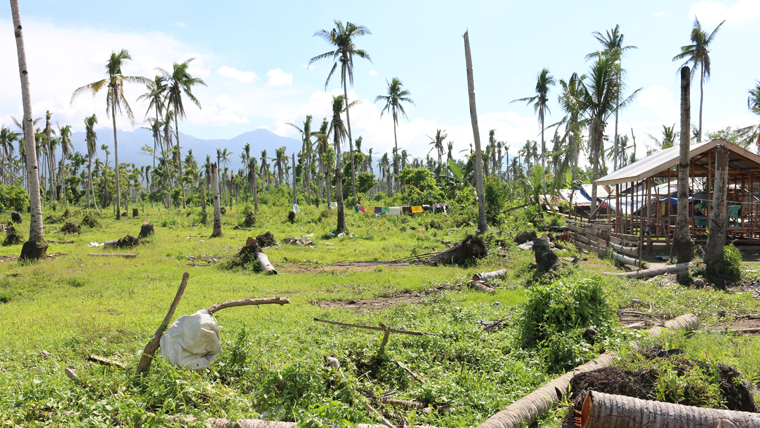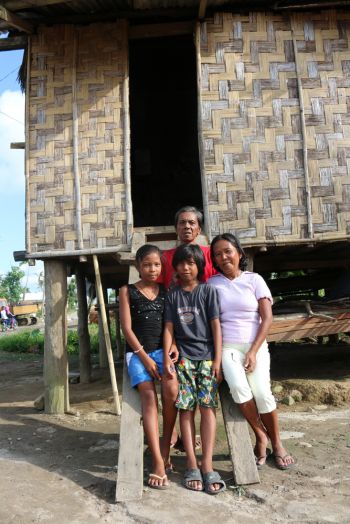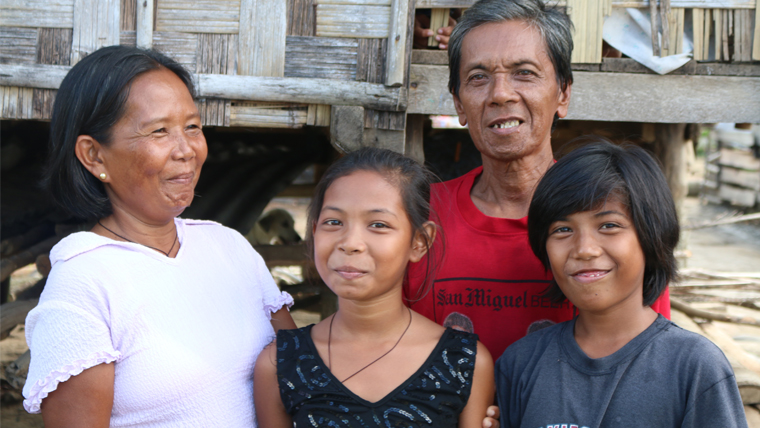Organic Farming: A Lifeline Not A Luxury
This week we mark 6 months since the world's strongest recorded typhoon made landfall in the Philippines. Amid the huge devastation Typhoon Haiyan wrought on their own lives, familes and property, World Vision staff flew into action to assess the damage and coordinate an enormous response, only made possible by the generosity of World Vision supporters.
Below, our colleague from World Vision Philippines, Leoniza, highlights some of the lesser-known impacts of these kind of disasters and talks to one family for whom organic farming is more than just a shelf in the supermarket: it's a lifeline.

by Leoniza O. Morales, Haiyan Response Communications
The town of Dagami 32 kilometers from Tacloban City prides itself on verdant lands with coconut, rice and corn. Yet the once plentiful harvest is now merely a memory after Typhoon Haiyan, the world’s strongest typhoon, left unprecedented destruction.
Based on government data, damage to crops reached £350m; coconut farming suffered the most with £232m-worth of crops lost. It will take six to eight years for coconut trees to be productive.
 “All the hard work and sacrifices were blown away by Yolanda’s (typhoon’s local name) fierce winds,” Eulita Dumpay, 57, utters with a sigh. Her husband Paquito, 58, tends coconut trees owned by a landlord and she works as a farm labourer, but work is scarce as even the landowners suffered great loss.
“All the hard work and sacrifices were blown away by Yolanda’s (typhoon’s local name) fierce winds,” Eulita Dumpay, 57, utters with a sigh. Her husband Paquito, 58, tends coconut trees owned by a landlord and she works as a farm labourer, but work is scarce as even the landowners suffered great loss.
They are one of the 3,423 coconut farmer families affected by typhoon Haiyan. 793,699 coconut trees were completely destroyed. Only 50% of the 87,301 severely damaged trees will recover and be productive after 3 to 4 years, according to the report of Dagami Municipal Agriculture office.
Eulita considers tilling the soil and seeing a new sprout from the ground one of her source of joy, so when she learned about a lecture on organic farming she came to listen and learn.
Lived experience of farmer-trainers
Around 40 people, mostly mothers, gathered outside the torn village hall as Reynaldo Cabudoc, a farmer and now a trainer and advocate of natural farming, explains the benefits of making and using organic fertilizers to regain the productivity of the soil.
World Vision links farmer-trainers to the communities as they have personally seen the benefits of using organic farming and can inspire these people to make the same decision.
“We encourage farmers to plant fast growing vegetables to avert food insecurity,” says Haiyan Response Livelihoods Manager Patricio Agustin. Backyard gardening will provide families with nutritious food their children need.
Dagami Municipal Agriculturist Leo Nevaliza explains they are also persuading coconut farmers to grow cash crops for the meantime like cassava, corn, sweet potato and even coffee as it will only take 3 to 4 years to harvest them.
“We welcome the efforts of NGO and other private groups to assist our farmers recover their livelihoods. We invite them to sit with us so our works will complement and to avoid duplication,” says Nevaliza.
The way back
![]() Armed with new knowledge, Eulita resolves to continue cultivating the land which she knows will once again reward them a good harvest. “My husband and I will plant more vegetables this time and will do our own organic fertilizer. It’s easy and good for the soil and the produce free from chemicals.”
Armed with new knowledge, Eulita resolves to continue cultivating the land which she knows will once again reward them a good harvest. “My husband and I will plant more vegetables this time and will do our own organic fertilizer. It’s easy and good for the soil and the produce free from chemicals.”
To build the resilience and capacity of the families to restore their livelihood, vegetable seeds were provided for the community garden in the villages of Sawahon and Hiabangan. The farmers received technical assistance on vegetable production like planting techniques and planting bed preparation.
Despite the devastation caused by Haiyan six months ago, communities are finally getting back on their feet and starting to plan for the future. Thanks to donations from World Vision supporters from around the world, families like Eulita’s are finally able to start fending for themselves and rebuilding their lives and livelihoods.
World Vision’s recovery work now focuses on strengthening the resiliency of typhoon-affected families through an integrated approach that supports needs in shelters, water, sanitation and hygiene, education and livelihood in the provinces of Leyte, north Cebu, Aklan and Iloilo.
